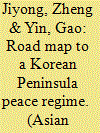| Srl | Item |
| 1 |
ID:
110800


|
|
|
|
|
| Publication |
2012.
|
| Summary/Abstract |
A unique phenomenon, the "conflict-reconciliation" cycle prevalent on the Korean
peninsula consists of three levels of fluctuating mechanisms: the vibrating ChinaU.S. rivalry at the international level; the chaotic Northeast Asia (NEA) management
mechanism at the regional level; and the vicious cycle of mutual cognition at the
bilateral level. This cycle has been shaped by the diversified strategic objectives of
NEA countries, the instability of the Republic of Korea (ROK) political structure,
the fluid nature of the power structure of the Democratic People's Republic of Korea
(DPRK) and the impulse of related countries to influence the regional situation.
The key to reverse and to reorient this cycle toward a more amicable direction lies in
the proper handling of big power relations, the improving of regional political cycles,
the upgrading of the diplomatic strategies of related countries, and understanding the
DPRK more precisely. As one of the most important issues confronting ROK
diplomacy, the "conflict-reconciliation" cycle offers a reference for solving other
regional and international problems, such as the rivalry between China and the United
States against the backdrop of China's rise, the proper role of ROK diplomacy,
the mutual understanding between the two Koreas, and the DPRK's efforts to
ease its political dilemma through economic means.
|
|
|
|
|
|
|
|
|
|
|
|
|
|
|
|
| 2 |
ID:
137189


|
|
|
|
|
| Summary/Abstract |
Sustainable peace and stability need an institutional guarantee. Based on the unique logic of its Korean peninsula policy, China has sketched a Chinese-style Korean Peninsula Peace Regime that comprises logic positioning, strategic objectives and priorities, a mechanism, a timetable, and a road map. The basic logic of the peace regime, the aim of which is long-term peace and stability on the Korean peninsula, is that it should include security but also integrate security with economy and culture.
|
|
|
|
|
|
|
|
|
|
|
|
|
|
|
|